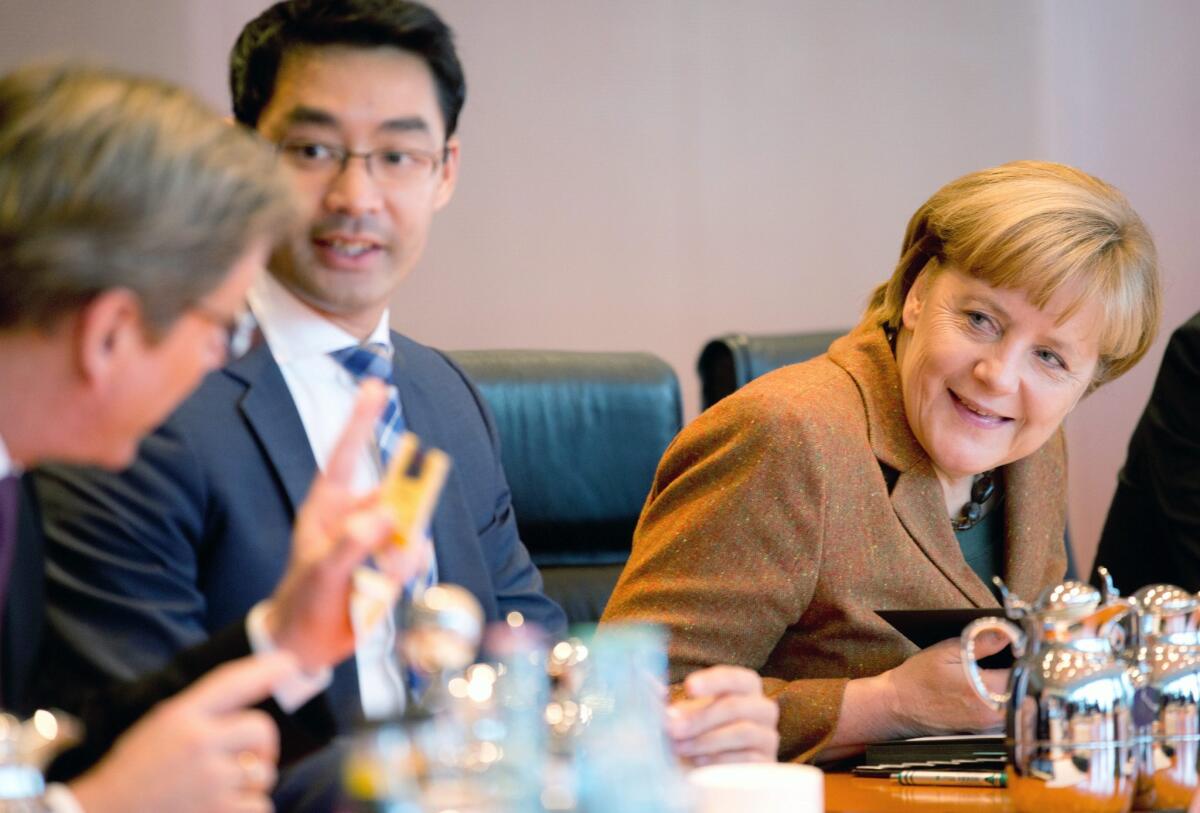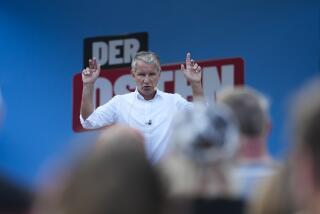Germany’s Angela Merkel struggles to form a government

LONDON -- While Americans struggle with a shut-down government, Germans are still struggling to form one, with the latest attempt by Chancellor Angela Merkel to woo a new coalition partner ending in failure Wednesday.
Germany has now gone nearly a month without a proper government since voters went to the polls Sept. 22. Merkel emerged triumphant from the election with a mandate for a third term, but her conservative bloc fell a handful of seats short of a majority in the Bundestag, the lower house of parliament.
Since then, Merkel’s party, the Christian Democratic Union, or CDU, has been engaged in delicate power-sharing talks with other parties. After several hours of negotiations through the evening Tuesday, the ecologically minded Green Party announced early Wednesday that it had decided against throwing in its lot with the CDU to form a new government.
Claudia Roth, the chairwoman of the Green Party, said the two sides had “discussed all the points from A to Z in depth” but that the gulf between them remained too wide. The parties disagree on such issues as healthcare reform and tax hikes on the rich.
That leaves Merkel with little choice but to keep bargaining with the party that finished in second place in the election, the center-left Social Democratic Party, or SDP. A new round of talks between officials of the two parties is scheduled for Thursday.
Although surveys show most Germans in favor of a “grand coalition” bringing together the two big parties of the right and left, the Social Democrats are leery of such an awkward marriage of convenience. The last time they entered into coalition with Merkel, during her first term as chancellor, they were given a drubbing at the polls by voters who saw little to distinguish the SDP from its historic archrival.
The Social Democrats are likely to demand major concessions, such as support for a national minimum wage, from Merkel’s conservatives in return for joining her government.
Although Merkel enjoys high personal approval ratings among the public and her party won more seats in the Bundestag last month than in 2009, her room for maneuvering is constrained because the business-friendly Free Democrats, her former coalition partner, were completely shut out of parliament. That has made Merkel’s CDU virtually the only conservative party still standing, and forced her to seek a governing partner from the left.
Negotiations are expected to drag on for several more days -- possibly weeks -- despite deep anxiety in other European quarters over German inaction at a time when the region’s debt problems remain a source of concern and its economic recovery fragile. The effort to stitch together a grand coalition in 2005 took two months.
In an embarrassing setback for Merkel, it emerged this week that the family behind the BMW car company had given her party the equivalent of about $932,000 just as her administration was lobbying other European countries to block higher emissions standards for big cars.
At a meeting of European Union environment ministers Monday, German officials managed to persuade fellow European Union members to water down the standards. On Tuesday, the Bundestag revealed that the wealthy Quandt family, which owns a controlling stake in BMW, had made its large donation to the CDU just last week.
Merkel’s government denies any link between the money and its lobbying of EU ministers. But Juergen Trittin, a senior Green Party leader, blasted Merkel on Twitter, saying the Quandts had successfully bought her environmental policy.
ALSO:
Iran nuclear talks continue amid pressure from Congress
Egypt’s American soccer coach goes from hero to scapegoat
Israel awards USC professors $1-million prize for energy research
Twitter: @HenryHChu
More to Read
Sign up for Essential California
The most important California stories and recommendations in your inbox every morning.
You may occasionally receive promotional content from the Los Angeles Times.











